

The YouTube comment section has long been considered the worst place on the internet. You won't find much consensus about anything online, but one thing pretty much everyone can agree on — including, seemingly, the people at YouTube itself — is that the user-generated content beneath practically every video is a semi-literate cesspool. But for the last year I've been increasingly discovering — thanks in part to a longer-than-usual lull in employment — that everyone was wrong.
Wasting time looking up old songs, I'd sometimes glance at the comments below the videos and idly wonder at their inanity. But occasionally I would see something different — something that seemed more real, more honest than the usual white noise. I didn't do much more than file them away mentally, but one day a comment on a James Blunt song (I swear I have no idea how I got there) stopped me in my tracks:

I didn't know who Harris or "breackinme" were, where they lived, how they met, how old either of them were — but in three lines, I felt like I knew something profound about their lives. The comment was just so honest and raw (I loved how the author un-self-consciously wrote "you were the sickest guy I've met in a while") that I knew it deserved to be held onto, somehow.
The more I looked, the more I found. And I discovered that, secretly, the YouTube comment box had become the strangest and most wonderful place on the internet. A place that was fascinating, endlessly moving, and heartbreakingly human.
Dig deep into comments — particularly on pop songs — and you'll see that buried beneath the hate speech, the poorly formulated insults, and the Obama conspiracy theories are countless amazing nuggets of humanity. You'll find stories of love and loss, perfectly crystallized moments of nostalgia and saudade (a Portuguese word meaning an ineffable longing for something lost in time). It's a repository of memories, stories, and dreams, an accidental oral history of American life over the last 50 years written by the site's millions of visitors every day.
But like all memories, it's ephemeral. Chunks of it disappear every day, when a video is deleted or pulled for copyright reasons, and there's no reason to believe it won't entirely evaporate when someday Google decides to revamp or "sunset" the comments section. Recently, Google introduced an overhaul of the system, integrating the comments more deeply with its Google+ social network — changes that are already unbalancing the strange, delicate ecosystem that produces a rare diamond among the thousands of useless or repetitive comments.
That's why I started my blog, Sad YouTube — to collect and preserve those precious fossils of human existence. I knew there were more out there, and I knew that they were fragile. In fact, going back to grab screenshots for this piece, I found that at least half the original videos, and many of the comments on still-existing videos, had already disappeared.

"I would like to send you a memory," begins one of my favorites, and you couldn't find a better expression of how the best comments work. (This is from French disco band Voyage's track "Souvenirs," which, appropriately, means "memories" in the original French):
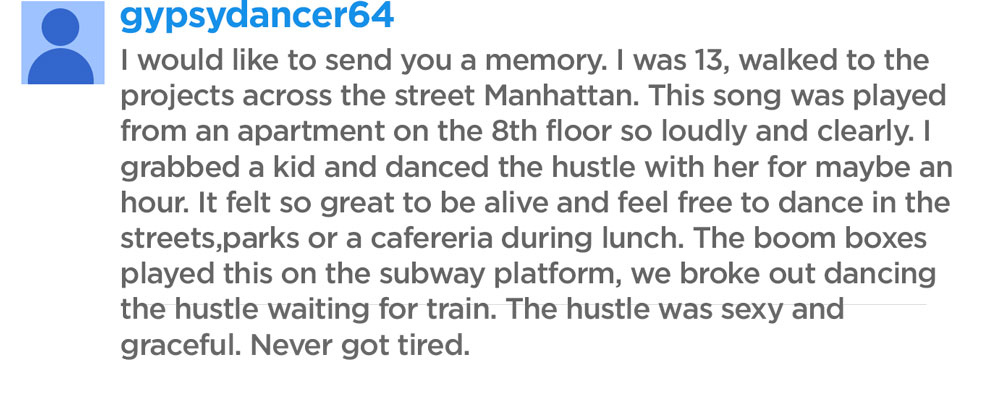
I love how that comment goes from telling a story rooted in a specific moment in time, on a specific afternoon, to a wider sense of what it was like to be alive when that song was playing everywhere.
Some comments told entire life stories. On Shannon's "Let the Music Play":

Some were full of agonizing regret. On a Latin freestyle megamix:

Some implied complex dramas and emotions that could barely be contained by the bounds of the comment box, like this comment, on Paul Mauriat's "Love Is Blue":

And some felt like tiny fragments of some huge oral history of America. On Petula Clark's "Downtown":
High school. After lunch, some of the girls would dance on the gym floor, before classes. Beth, JoEllen, Nina, to name a few. This song had come out, and they just danced to it. I remember sitting, and waiting for my favorite girl to come out. When she did, my heart beat sped up till I thought I would pass out. She knew I was there. I heard it at Travis AFB, before going to Nam. I just cried, while waiting to board the plane.
You would never read that story in any history of the Vietnam War, but it tells you so much about what it must have felt like to be young and alive at that time.
Reading them felt like I was quantum-leaping into moments in people's lives throughout the last 50 years. The time-shifting effect works in a couple ways: Any video that's more than a few years old becomes a timeline of that song's presence in pop culture, like the rings of a redwood tree. Here the song was featured in Family Guy (dozens of "Family Guy brought me here!" comments); here the singer died (hundreds of RIPs); here it was featured in an ad ("Sad that so many people know this from a commercial").
What I look for are comments that tell a whole story in just a few lines — a picture emerging from several quick brushstrokes. Comments that bring a specific moment to life that would have otherwise just dissolved forever in time — like this on Odyssey's "Native New Yorker":

How profound, the idea that it's the boring, everyday moments in life — not necessarily the milestones, the weddings, and the graduations — that you look back and long for.
Vietnam-era music inspired many profound and melancholy memories from that period, like this comment on The Left Banke's "Walk Away Renee":

Or this electrifying story, on Procol Harum's "Whiter Shade of Pale" (like all of these, you really need to be listening to the song to get the full effect):

I found many moving comments on uploads of old disco records. People would listen to them, I sensed, and remember when they were young and healthy and their lives were full of fun (at least in hindsight). Their comments would invoke this beautiful mixture of joy and loss; maybe for the first time in years, they would remember what it felt like to be themselves a long time ago. There was an almost mystical sense to them, like listening to an old song on YouTube would become a sort of séance, a way to invoke the spirits of friends and lovers long gone.
On Change's "A Lover's Holiday":

From Waterfront Home's "Take a Chance on Me":

Not all of the most poignant comments come from a long time ago, though. They're really everywhere, on any song that could provoke an emotion. On Taylor Swift's "Fearless":

I posted the comments as is — the unique and vernacular way in which they were written, strange abbreviations and typos and misspellings included, are a huge part of their authorial voice. I can't imagine this comment, on Sam Cooke's "A Change Is Gonna Come," formatted in any other way:

Or this, on Dean Martin's "Everybody Loves Somebody":

They're like little, unintentional poems, and the errors are an indelible part of their richness.
And some of the writing on YouTube comments, though not conventionally "correct," is astonishingly powerful in its construction, in the way the stories' intricacies unfold. Some of them, like this, on Fleetwood Mac's "Little Lies," have devastating twist endings:

Or this memory of the Archies' "Sugar Sugar":

This comment, on Eddy Grant's "Electric Avenue," goes from erotic reverie to genuine remorse in the space of one sentence:

(The capitalized "Regret" is an exquisite touch.)
Sometimes I felt like I was listening in on a conversation the writer was having with him or herself, laced with complicated emotions: sorrow at a loss, joy in the memory of the person or place lost. On The Manhattans' "Gonna Miss You":

And something about the way some of them are written just give me chills for reasons I can't quite explain, like this, on the Schoolhouse Rock song "Figure 8":

Or, for the same song, this rush of nostalgia.

Within days or even hours, their memories are lost in the ever-flowing sea of comments, pushed down on to the seventh or ninth page of them, where no one (except me) ventures.
I began to wonder who exactly these commenters were — these semi-anonymous poets keeping me up every night scouring pages and pages of text for their lyrical little gems. I had this image of the perfect commenter in my head: a non-writer, certainly not a professional, maybe someone not proficient with computers, a little older. He or she comes across an old song — maybe by accident — and is instantly ambushed by a memory or emotion. Where else to write it, than the blank, nonjudgmental YouTube comment box at the bottom of each video?
But was my mental image at all accurate, or was I just idealizing (and maybe condescending to) my commenters?
I needed to find out, so I went looking for them.

Mike Mennen was using his new computer when he came across a song he'd first heard on a memorable, terrible night nearly 50 years before. A vintage sign appraiser in his early sixties, Mennen was looking up videos of old, familiar songs, many of which he'd once owned on vinyl but which he'd lost during a struggle with drug addiction. It was there, while browsing songs from 1962, that Mennen saw a link to an unauthorized upload of the song "Telstar," a hit from that year by The Tornados.
"Telstar" is an eerie sci-fi surf instrumental named after the communications satellite launched that summer while the world was still gripped with Sputnik fever. It's haunting and evocative for even the first-time listener, but when Mennen clicked on it, he immediately thought of the first time he heard the song — a jagged memory of violence and loss that informed the rest of his life. And so he told his half-century-old story in the closest place he had at hand: the YouTube comment box.
When I first came across Mike Mennen's comments on "Telstar," I got chills. His story was spread out over three comments (the second two are in response to other commenters' questions).
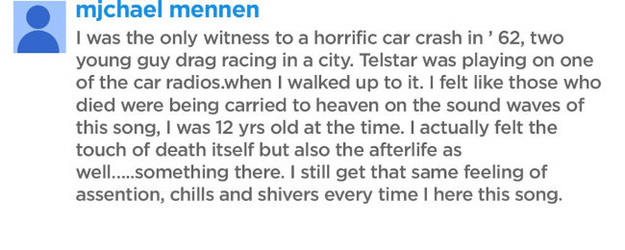
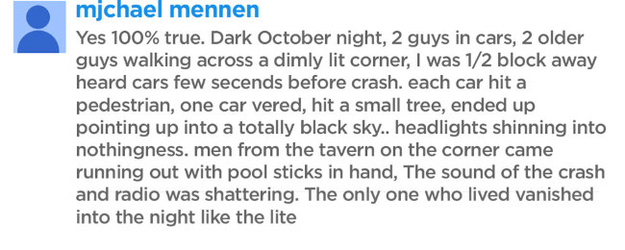

This story of this drag-racing accident, which happened so many decades ago, has haunted me in the year since I first read it. So I tracked Mike Mennen down.
"That was the first time I'd ever heard that song," he told me over the phone, after I'd located him using some quick internet detective work. It was 1962, the year of the song's release, and Mennen was then 13 years old, living in Burlington, Iowa. His mother was playing bridge at his aunt's house when, out of boredom, he decided to go to a convenience store across the street from a bar called Joe's Inn.
"There was a big main street called Harrison, and the kids used to drag race there," he said. "Back then, the kids all used CB radios — they'd use them to get together and tell everybody that there were no cops or traffic around. So, they were drag racing and there were two old men walking across the street — they were probably about the age I am now, 64, 65."
"The cars just came flying out of nowhere and hit them. I was about a block away. I heard the screeching and I heard the sound of the tires when they swerved. And one of the cars hit one of the men and then hit the tree."
"It's eerie. I did, I did get a feeling of a sense, like I said in the post, strangeness. There were body parts all over. It was a dimly lit corner because the streetlight there was out. And so that's why they didn't see the guys, I guess."
The cars, the bodies, the song still playing out the wreck's speakers: The images of that night never left Mennen, but that story would have almost certainly never reached me if it weren't for the text box confessional beneath every YouTube video.
"I came across the song on YouTube and I played it and then it started coming back to me," Mennen said. "I've never really forgotten it. I could even tell you things about how the doors were after the accident, everything. It's frozen in my mind. I'm an artist, I could actually draw the scene if I wanted to. That night was the first time I'd heard the song, and ever since, when I do, that thing comes back."
The video of "Telstar" where Mennen wrote those comments has been pulled on copyright grounds; it and his comments are now gone.

I first came across amberjetblue's story in a comment on the Four Seasons' hit "Sherry," which, like "Telstar," also dates from 1962: Though there weren't any identifying details anywhere on her YouTube profile, I googled her handle and found it was also being used on eBay. I contacted her using eBay's internal messaging system and she replied within a couple of hours.
A few days later, I was having a Skype video session with Amber, a charming woman of 70 now living in a small town in England.
"I was a real beatnik," she said of the era she wrote about in her comment. "I lived on a boat down at Shoreham, on a barge that an old sea captain had given us. I traveled all over the country, hitchhiking here and there and everywhere. We used to sleep in empty houses and empty office buildings in the West End. It was still very illegal to be gay. I wasn't gay, but I found I got on really well with the gay guys because they were lovely. Very many of them had run away like me, because they were in difficult situations. We were like little lost birds. We all used to flock together."
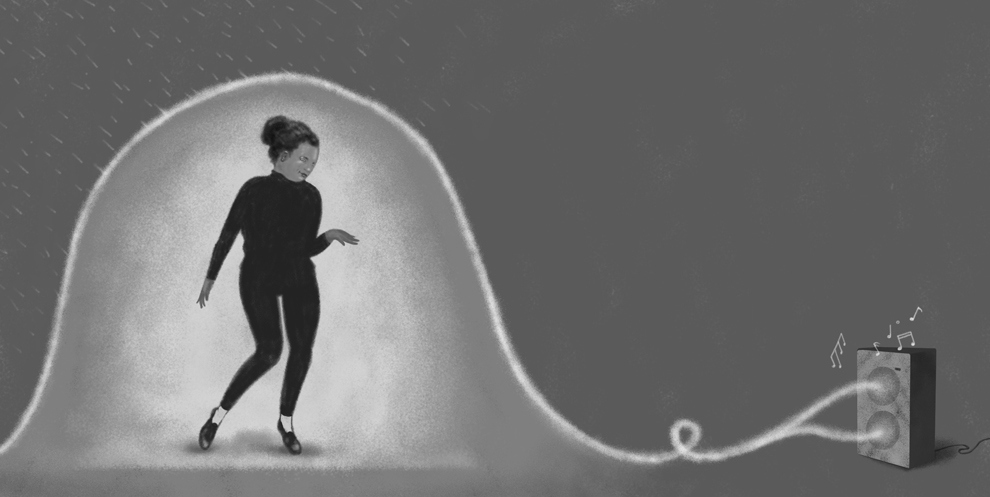
Amber's life story is fascinating: She talked credibly about hanging out with Cat Stevens and Rod Stewart before they became famous and showed me glamour shots of herself as "Amber St. Clare," the stage name she took when she performed high-class striptease for American GIs in Okinawa, Japan, during the Vietnam War. A unifying theme to her life seems to be music. And when she finds herself browsing YouTube, those moments in her lives return to her.
"For people, especially people my age," she said, "certain songs have immediate memories for you. It's mostly by accident. You'll be doing something else, and you'll be scrolling through, then suddenly something else will hit you. And you'll say, 'Oh, I remember that,' and then you play it. And then that's it and you remember it!"
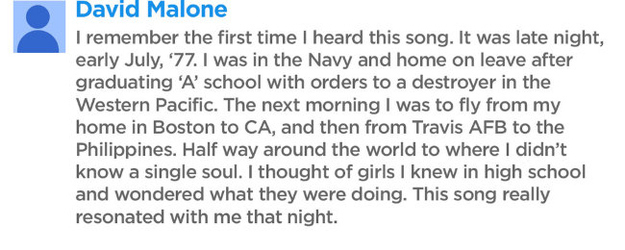
David Malone's comment on E.L.O.'s "Telephone Line" perfectly captured a moment in his life that anyone who's spent time away from home can relate to: I found Malone because in another comment he mentioned his high school, and some Facebook searching eventually found me a likely candidate. "I was 19 years old, and would turn 20 the next month in August," the now-56-year-old Malone said. "I had been in the Navy for about eight months and was finally leaving training with orders to the fleet."
Whenever he hears "Telephone Line," he said, he experiences a sort of emotional cocktail, one familiar to anyone who's spent time poring through YouTube comments: "It brings back memories of loneliness, excitement, anticipation, and trepidation."
Malone is familiar with the many ways we remember and interpret the past. Actually, you might say that's his job description. "History and memories are a large part of my life," he said. "I work today for the National Park Service as an interpretive ranger. I've always loved history and have a strong connection to it (which is why I do the job that I do). Music from my life always evokes memories, and I can usually date the song to within a few months of when that song was released. Sometimes, it brings thoughts to my mind that I hadn't thought of in years ... good and bad memories."

Part of what I think is wonderful about YouTube comments is exactly what makes every comment section so terrible: the anonymity. It's been shown that people feel free, in comment sections on news websites or blogs or, yes, YouTube, to express the darkest inner feelings, their most hateful and intolerant ideas — stuff they might not have even realized they were capable of until they adopted the safety of a screen name. It makes sense. But at the same time, I believe that anonymity and pseudonymity help people open up and talk about stuff that they may never have otherwise. You get the impression, once you've read enough comments, that some commenters had no idea when they showed up at YouTube that day that they'd be expressing something so personal or powerful. Just take a look at their screen names. For instance, read this heartrending story, on Herb Alpert's "This Guy's in Love With You":
Last year of high school for me. 1967. My best friend and his girlfriend who we were both in love with though he never knew. Haven't seen her in 35+ years. You always remember the ones that got away. Never told anybody. Their song.
Now look at his handle:

Certainly, some commenters, like David Malone, use their own real names. But many have only done so after being repeatedly nagged by Google, and their comments were originally written under a pseudonym. (I know, because many of the comments I grabbed months ago featured screen names then, but now that I've gone back to get screencaps, I see that many have changed to real-sounding names.) And Google's shift to making YouTube comments a subsection of its Google+ service feels like it's also an attempt to regulate or rein in the tone of YouTube comments.
Anonymity can be a shield for hateful speech, but it can also allow people, the wanker4761s of the world, to express themselves fearlessly. I don't think Google realizes what it's sacrificing when it strong-arms its users into declaring their real names. The YouTube comment box is a space of nearly infinite potential, a place for people to express their deepest desires, most tender emotions, and haunting memories. But without a way for commenters to protect their identities, something will be lost.
The YouTube commenting community, such as it is, seems to recognize this. Response to the Google+ integration has been almost uniformly negative — even vitriolic. Comments sections are littered with complaints. A petition to reverse the changes has reached over 200,000 signatures. And perhaps most damningly, YouTube co-founder Jawed Karim deleted all his videos — save for "Me at the zoo," the first ever posted to the site — and posted, "why the fuck do i need a google+ account to comment on a video?" And YouTube itself has admitted that the changes it's made have actually increased the amount of spam in the system.
The changes have also already affected the way I hunt for comments. For one, they're now littered with meaningless notifications about who posted the video to their Google+ profile and when. Google+ posts, which have a much different flavor than YouTube comments (they're comparable to Facebook discussions — more civil but infinitely less revealing) are now interspersed with the "genuine" comments, and, of course, the pressure to use real names is on. The comment section is in the process of being tamed, and it already seems like a vastly less interesting place.

The YouTube comment section may be the world's biggest information trash heap, but where do archeologists go when they're trying to understand the lives and ways of ancient civilizations? They look in their garbage. Sad YouTube is just one lone garbage picker strolling through mountains of detritus. It takes time to pick through it, but the rewards are glorious. And what's so fascinating is that YouTube has accumulated all this wealth seemingly without ever realizing that it's there. For a company so focused on the uses of Big Data, Google seems totally unaware of the human and narrative gold mine it possesses in YouTube's comments section, and I fear it will just get rid of it altogether one day like it did Google Reader, Google Wave, or a million other projects whose uses weren't obvious.
Because the magic thing about the wonderful, jagged narrative found in the comments of YouTube videos is that it's all a big accident. You couldn't intentionally design a site that elicits the kinds of heartbreaking, personal stories I find in YouTube comments. A site specifically for sharing memories would attract people who are adept at writing or already used to sharing. But not everyone knows they have a story to tell — not until a song starts playing and the memories come rushing back. And sometimes, often, the stories they share are truly profound.
In his "Telstar" comments, Mike Mennen talks about how witnessing that car crash made him believe in life after death, and how important that was to him years later, when he was in Vietnam.
"I have PTSD and I don't really want to get into that," he told me. "But life after death, that death is definitely not something to fear: I got that from that night. That's what the song 'Telstar' represents to me. Telstar was the transitional period between being on Earth and leaving Earth, from us being stuck on this planet to leaving this planet. I always made that connection with that song. The symbolism of the Telstar leaving this Earth, and the song playing when those people were killed."
I doubt I'll ever hear the song, or see a satellite tracking across the night sky, without that coming to mind. That, and countless moments that haunt me, would have remained secret, known to only the people who experienced them, were it not for the weird, profane, and undeniably wonderful world of the YouTube comment box.






